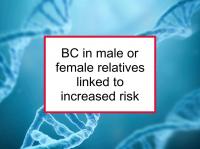A new study has reported on the effect of a family history of breast cancer on breast cancer risk in women over 30. A history of breast cancer among first degree relatives (parent, sibling or child) and second degree relatives (grandparent, grandchild, aunt/uncle, niece/nephew, or half-sibling) is known to increase the risk of breast cancer.
However, the reliability of self-reported data in some studies may be an issue when evaluating instances of multiple affected close and distant relatives. In addition, study data on affected males is limited. The study was designed to avoid these drawback.
The authors used the nationwide Swedish Family-Cancer Database to estimated the effect of family history of breast cancer for women of at least 30 years of age. The analysis was performed after adjusting for age at diagnosis, period of diagnosis, number of children, age at first birth, geographic region, and socioeconomic status.
Broadly speaking, the risk of breast cancer was found to be increased with both a first degree and second degree family history, as expected. The excess risks were very similar when either a father or a mother had breast cancer (1.73 and 1.74 times the expected risk, respectively). Having at least two female first degree relatives with breast cancer increased the risk to approximately 2.8 times the expected risk, indicating an additive interaction.
When both parents had breast cancer, the risk of breast cancer was increased approximately tenfold. The risk for a woman increased more when a brother had breast cancer (2.48) than when a sister was affected (1.87). With respect to second degree relatives, having a grandmother with breast cancer was associated with lower familial excess risk than having an affected half sister (1.27 and 1.26, respectively, for maternal relatives; 1.39 and 1.50, respectively, for paternal relatives).
The authors summarize that when both parents are diagnosed with breast cancer, the risk for their daughter is increased tenfold. Having an affected brother results in a somewhat higher risk than having an affected sister. Male breast cancer appears to have a higher genetic basis than female breast cancer, which suggests the need for further research concerning the underlying mechanisms.
Familial breast cancer does not make BC inevitable
The BRCA mutation of study participants was unknown. However, based on previous research, a minority of breast cancer patients with a family history are BRCA mutation carriers. In fact, relatives of BRCA mutation carriers who do not themselves have a harmful BRCA mutation do not appear to have increased risk of breast cancer compared to the general population. While it is clear that familial breast cancer has a genetic component, it is by no means inevitable that a women with relatives with breast cancer will develop the disease. In fact, the study results show that the risk is less than three times the expected risk (which translates very approximately into a one in four or one in three lifetime risk of developing the disease) for most combinations of relatives with breast cancer. This suggests that lifestyle factors influence whether breast cancer develops.
While most of those reading this news story already have breast cancer, there is still an opportunity to reduce the likelihood of breast cancer in high-risk daughters, grandchildren, and other relatives. Please see our articles on reducing breast cancer risk in our daughters (prenatal period and infancy, childhood and puberty, or teenage years and young adulthood) and sons for more information.
